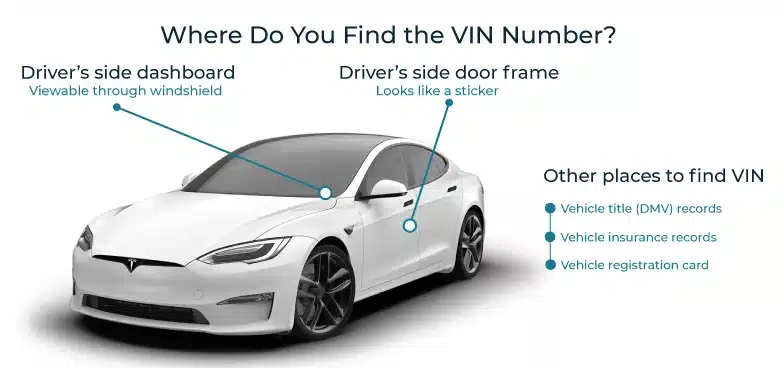VIN Check California
More than a million cars are registered daily in California. Are you one of them, too? Use the California VIN check and make sure the car’s title is clean so you can easily register the car without any hassle.
Save Thousands with a California VIN Check
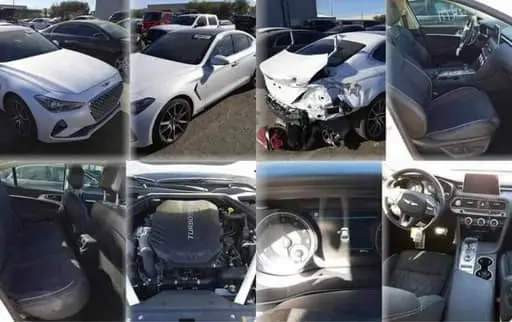
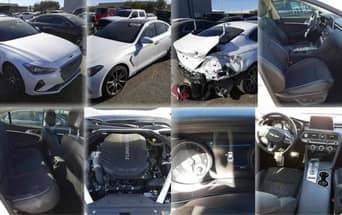
- Was marked as salvage
- Has an impressive record of lien/loan
- Involved in an accident
What is a California VIN Check?
Buying a used car in California? Don’t rely on just what the seller says. A VIN check shows you all the hidden problems that aren’t always disclosed, like past accidents, thefts, or title issues. The Vehicle Identification Number (VIN) is a unique and used to identify a vehicle even though the year, make, model, and trim are the same.
A quick VIN check can help you avoid buying a damaged, stolen, or unsafe vehicle. It’s your first thing to do before you finally make any payments.
Why Running a California VIN Check is a Must?
How to Find Your Car's VIN Number?
You can locate the Vehicle Identification Number (VIN) in several key spots on the vehicle and its documents:
- Dashboard: Look through the windshield on the driver's side.
- Driver's Side Door: Check the door frame or sticker when the door is open.
- Engine Bay: Look at the front of the engine block.
- Registration Documents: VIN is often listed on vehicle registration and insurance papers.
How to Run a California VIN Check?
Step 1
Click on the form above.
Step 2
Fill in the details with the VIN or license plate, then click the button.
Step 3
See the preview report.
Step 4
Proceed to payment to get the full vehicle history report.
What Hidden Information Can You See with a California VIN Lookup?
Make sure before you purchase any used car in California, be it from a private seller or a big dealerships, run the California VIN check and get a vehicle history report. Here’s what’s included in the report:
Title Check
Find out if the title is clean, rebuilt, salvaged, or junked. Avoid unexpected repair costs and legal issues by verifying the title status early.
Accident Records
See how many times the car was in an accident, the date, location, the type of damage, and whether airbags were deployed.
Stolen Vehicle Records
Discover if the car was ever reported stolen. This includes details like the location, date, and source of the theft record, so you don’t end up buying a smuggled or stolen vehicle from another vehicle.
Auction Records
Get access to past auction data, including up to 10 photos showing the vehicle’s real condition. See where and when it was auctioned and whether it was listed with damage or salvage status. Also, you can see the sold price of the car.
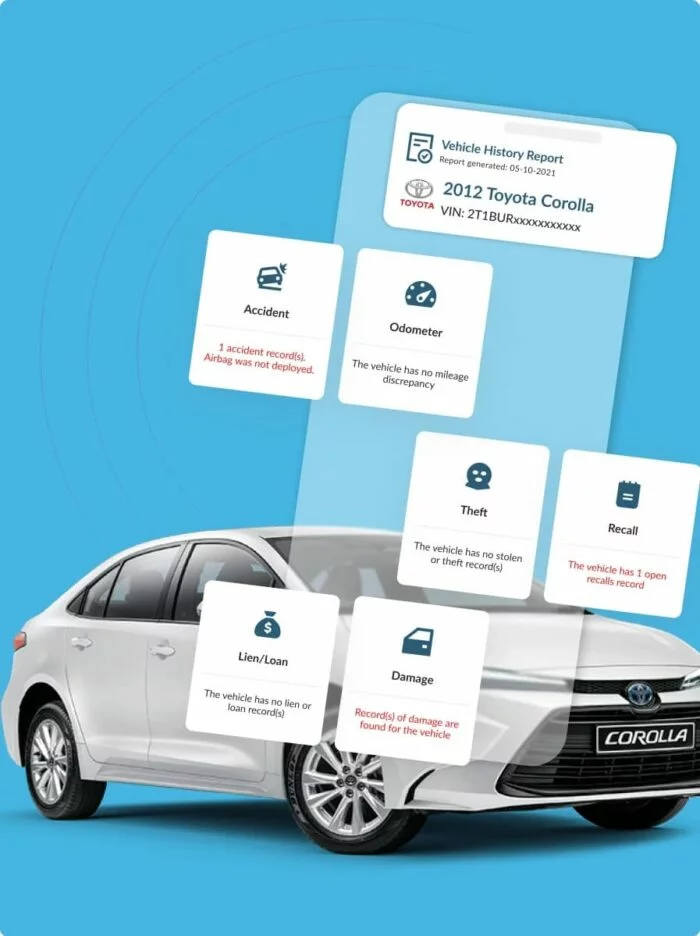
Odometer Reading
Track mileage over time and detect any rollback attempts. A tampered odometer can hide the true wear and tear of a car. Get the data on mileage reading from the first time the car was used.
Lien or Loan Records
Check if there are any active loans tied to the vehicle. Make sure the previous owner has cleared all financial obligations before you take ownership.
Damage Verification
See if the vehicle has suffered from any damage. Check the damage is from an accident, natural disaster, fire, dent and scratches, and many more.
Event Verification
Check what event has happened in the past. See if the vehicle has been marked as abandoned, repossessed, duplicate title, or had its insurance lost.
Check Classic Car VIN in California
Looking to buy a classic car in California or already own one? Use a vintage VIN lookup to verify the vehicle’s originality to help you spot if the vehicle has been heavily modified. Classic VINs (typically 5–14 characters) get you the records like accident, title, and many more.
Always run a classic VIN decoder before purchasing a vintage vehicle. It protects you from scams and confirms the car’s authenticity and collector value.
How the California VIN Check Came to Be Useful?
William wanted to buy a used 2014 Chevrolet Sonic for his girlfriend’s birthday gift. He lives in Los Angeles, but the seller is in Sacramento, so he drives for a long time and wastes more time if the car comes in a very bad condition. He decided to check the VIN first and get the report.
Sample VIN: 1G1JA5SH4E4153457
First Impression
- The car body has no dents or scratches to be seen
- The price was slightly higher
- than other sellers
Actual Car’s Condition
- 5 lien or loan record(s)
- 3 service & repair record(s)
- 1 accident record
- 1 Record of damage
- Was repossessed
- Marked as salvage
- Has rebuilt title
Outcome
- Helps William avoid buying an expensive used car with many problems Always be cautious and don’t be tempted by a “cheap” price.
Why VIN Check Important?
- To avoid buying a used car with hidden records.
- Never ever trust a seller’s claim before making sure for yourself.
Reasons Why You Should Check the VIN in California?
More and more reasons to run a VIN check in California aside from ending up buying a used vehicle with plenty of problems, like being marked as salvage, having a lien or loan intact, having been auctioned, and more.
See the Actual Vehicle’s Title
Examine the title and ensure it’s clean, so no need to deal with fixing and repairing.
Check if it's auctioned
Auctioned vehicles tend to have more problems compared to ones that were sold by a private dealership or seller.
Use the Report as a Negotiation Tool
See if the car was ever recalled? Use that pointer to make a valid argument when negotiating.
Check if it's stolen
Spot if the vehicle was stolen. If you accidentally buy one, be aware that the car can be seized, and your money will not be returned.
See the Real Odometer Reading
Odometer tampering is a common crime committed by the seller. Run the California VIN check to get the real mileage reading.
Helps You Make a Good Decision
Getting a vehicle history report helps you make a good decision based on the information on the report.
CA Laws Related to VIN Checks
California has specific regulations governing vehicle purchases, including title transfers and emissions requirements. Knowing these laws is essential for compliance when buying used vehicles. Here’s everything you need to know:
Title Transfers in CA
After a vehicle is sold, it’s necessary to transfer the title to the current legal owner. If you’re buying from a dealership, they’ll handle the paperwork, and you’ll receive your title from the DMV. For private sales, follow these steps:
- Obtain the Title: The seller must provide the original California Certificate of Title. If lost, request a duplicate from the DMV.
- Complete the Title Transfer Section: Both parties fill out the title transfer section on the back of the title.
- Submit Required Forms: The buyer may need to complete a Statement of Facts form (REG 256).
- Payment of Fees: Fees usually include a transfer fee (around $15) and a use tax based on the sale price.
- Submission to DMV: Submit the completed title and forms to the DMV online or in person.
Be aware that failing to complete this within 30 days may incur penalties.
Insurance Registrations
Insurers evaluate a vehicle’s history. such as accidents, thefts, and title issues, to determine risk levels and set premiums. For instance, cars with prior accidents often face higher premiums, and vehicles reported stolen may not be covered by some providers.
On average, full coverage car insurance in California costs about $2,645 per year, while minimum coverage averages $631 per year. After purchasing a used vehicle, you need to register for insurance within 30 days to avoid registration suspension.
VIN Replacements in CA
In California, VIN replacements may be necessary in scenarios such as when a VIN plate is damaged, missing, or destroyed. The California DMV allows for replacements under specific conditions, including vehicle reconstruction or restoration.
To initiate a replacement, vehicle owners must apply and may need to provide documentation of the vehicle’s condition and history. Unauthorized alterations to a VIN are illegal and can result in criminal charges under California Vehicle Code 10750.
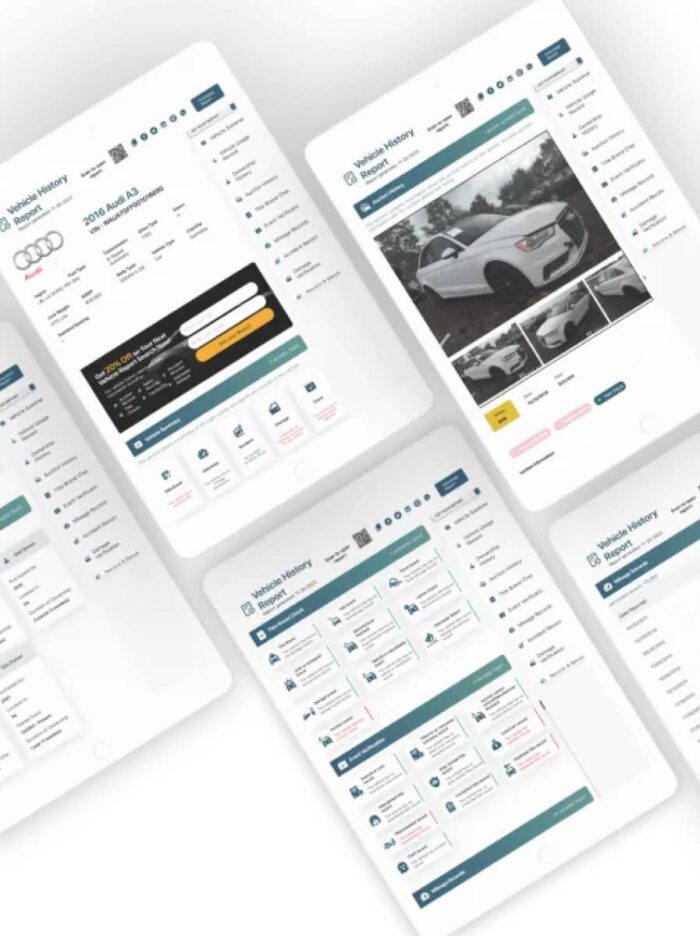
Why Use Detailed Vehicle History to Run the CA VIN Check?
Detailed Vehicle History offers VIN reports with data like specs, mileage, theft/accident records, auctions (with up to 10 photos), title checks, ownership history, liens, and more.
Our mission is to help California car buyers and sellers make better decisions to avoid scams and buy reliable used vehicles faster and at a fair price. Try a VIN check today to get started.
Useful Resources for Car Buyers in California
Customers Testimonials
Excellent service
First time I ever used an online company to get a monroney. The website was easy to use and navigate through…Read More
Will Ruff
I have used this service several times. Thank you, Richard for your quick response and assistance. I am well pleased with your patience and assistance…Read More
Dee Hunter
I read about this on a car site and tried it. The results were very helpful such as accident and maintenance reports. I would do it again and recommend it.
Gordon Karsn
Run VIN Check in Other States
- Alaska
- Alabama
- Arizona
- Arkansas
- California
- Colorado
- Connecticut
- Delaware
- Florida
- Georgia
- Hawaii
- Idaho
- Illinois
- Indiana
- Iowa
- Kansas
- Kentucky
- Louisiana
- Maine
- Maryland
- Massachusetts
- Michigan
- Minnesota
- Mississippi
- Missouri
- Montana
- Nebraska
- Nevada
- New Hampshire
- New Jersey
- New Mexico
- New York
- North Dakota
- North Carolina
- Ohio
- Oklahoma
- Oregon
- Pennsylvania
- Rhode Island
- South Carolina
- South Dakota
- Tennessee
- Texas
- Utah
- Vermont
- Virginia
- Washington
- West Virginia
- Wisconsin
- Wyoming
FAQs About VIN Check California
Does a California VIN Check Show Failed Smog Test History?
Yes. California VIN checks often include emissions test results, especially in areas where smog checks are required. If a vehicle has failed a smog inspection, it may appear in the history report, helpful for buyers in emissions-regulated zones like Los Angeles or San Diego.
Can a California VIN Check Reveal if a Car Has Been Involved in Wildfires?
In some cases, yes. If a vehicle was damaged in a wildfire and reported as salvage or total loss, it will show up in the vehicle history report. This is especially important in California, where fire-damaged vehicles are sometimes resold without proper disclosure.
Will a California VIN Check Tell Me if the Car Has Unpaid Tolls or Tickets?
No, VIN checks typically do not show unpaid tolls or parking violations. These are tied to the vehicle’s license plate or the registered owner, not the VIN. However, a VIN check can reveal more serious issues like liens, theft records, or title problems.

